I've been trying to configure UART module of LPC1768. Board comes with a crystal oscillator of 12Mhz. It does nothing more than receiving a character and transmitting it at the same time. I am using Keil simulator. This is the code,
#include <LPC17xx.H>
void uart_init()
{
LPC_PINCON->PINSEL0 = 0X0500000;
LPC_UART2->LCR = 0X83;
LPC_UART2->DLL = 162;
LPC_UART2->LCR = 0X03;
}
int main()
{
uart_init();
while(1)
{
while(LPC_UART2->LSR & (1<<0));
LPC_UART2->THR = LPC_UART2->RBR;
while(LPC_UART2->LSR & (1<<6));
}
}
I'm not configuring any PLL register, only using default values.
I"ve referred several forums to find the baud rate, https://www.google.co.in/search?q=lp1768+pclk&rlz=1C1CHBF_enIN754IN754&oq=lp1768+pclk&aqs=chrome..69i57.5207j0j1&sourceid=chrome&ie=UTF-8
By referring system_LPC17xx.c,
#define CLOCK_SETUP 1
#define SCS_Val 0x00000020
#define CLKSRCSEL_Val 0x00000001
#define PLL0_SETUP 1
#define PLL0CFG_Val 0x00050063
#define PLL1_SETUP 1
#define PLL1CFG_Val 0x00000023
#define CCLKCFG_Val 0x00000003
#define USBCLKCFG_Val 0x00000000
#define PCLKSEL0_Val 0x00000000
#define PCLKSEL1_Val 0x00000000
#define PCONP_Val 0x042887DE
#define CLKOUTCFG_Val 0x00000000
From #define PLL0CFG_Val 0x00050063,
Bit 14-0 supplies the M value, and the value stored here is M-1; 0x0063 which is 99 in decimal, So M = 100,
Bit 23-16 Supplies the value "N", The value stored here is N - 1; 0x05=5 in decimal, so N = 6
From #define CCLKCFG_Val 0x00000003,
Bit 7-0, Selects the divide value for creating the CPU clock (CCLK), By putting a value of 3, CCLK = PLLCLK/4
I'm using UART2, which comes under PCLKSEL2,
From #define PCLKSEL2_Val 0x00000000,
when set 0, PCLK_peripheral = CCLK/4
TO find PLL0 freq, PLL0_clk = (2 * M * FOSC) / N Cr ==>PLL0CLK = (2 * 100 * 12)/6 ==>PLL0CLK = 400Mhz
Now, CCLK = PPL0CLk/4 ==>CCLk = 400 / 4 = 100Mhz
and PCLK = CCLK/4 = 100/4 = 25Mhz
To calculate DLL, DLL = PCLK/(16 * Baud rate) for 9600 Bpm, DLL = 25000000/(16 * 9600) ==>DLL = 162
But I can't transmit or receive anything when I tried to simulate the program I've only limited knowledge in ARM, that's why I wrote my calculation method so that anyone can correct me if I'm wrong.
Also,
In the datasheet, they've given a table showing Multiplier values for PLL0 with a 32 kHz input

But using this equation PLL0_clk = (2 * M * FOSC) / N, I couldn't find any value given in the table, eg: for M = 4272 and N = 1, PLL0clk = (2 * 4272 * 32)/1 = 273408 kHz, 273.408 Mhz, But in given table it's 279.9698
Thanks
